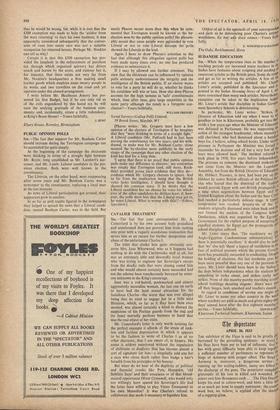PUBLIC OPINION POLLS
SIR, —The fact that support for Mr. Bonham Carter should increase during the Torrington campaign can be accounted for quite simply.
At the beginning of the campaign the electorate were thinking in terms of a straight fight between Mr. Royle, long established as Mr. Lambert's suc- cessor, and Mr. Lamb, Labour candidate in the pre- vious election. Both were well known in the, constituency.
The Liberals, on the other hand, were reappearing after seven years and Mr, Bonham Carter was a newcomer to the constituency, replacing a 16cal man at the last moment.
As news of Liberal participation got around, their supporters grew in number.
In so far as poll results figured in the newspapers they helped to spread the news that a Liberal candi- date, named Bonham Carter, was in the field. But
surely Pharos meant more than this when he com- mented that Torrington would be known as the by- election won by the public opinion polls? He piesum- ably meant that some people were persuaded to vote Liberal or not to vote, Liberal because the *polls showed the Liberals in the lead.
Again I have to draw Pharos's attention to the fact that although this allegation against polls has been made many times over, no one has produced evidence to substantiate it.
If I may be allowed one further comment. The view that the Clectorate can be influenced by opinion polls seriously underestimates rthe integrity and the intelligence of the British public. If an elector wants to vote for a party he will do so, whether he thinks his candidate will win or lose. How else does Pharos account for the high turnout in 'safe' constituencies which, time after time, give large majorities to the same party although the result is a foregone con- clusion?—Yours faithfully,
WILLIAM GREGORY
Social Surveys (Gallup Poll) Limited, 59 Brook Street, Mayfair, WI
(Pharos writes : `Mr. Gregory must have a low opinion .of the electors of Torrington if he imagines that they "were thinking in terms of a straight fight." A Liberal candidate (Mr. Fulford) had in fact been nursing the constituency for two years; and his with- drawal, to make way for Mr. Bonham Carter, alone secured the by-election more publicity in the early stages of the campaign than any other election of the kind has had for a long time.
`1 agree that there is no proof that public opinion polls make any difference to electors: my contention was simply that Torrington (and, still more, Roch- dale) provided prima facie evidence that they do— evidence which Mr. Gregory chooses to ignore. And so far from the implication being that the British voter lacks 'intelligence, I should have thought it showed his common sense. lif he thinks that the Liberal candidate has no chance he votes for which- ever of the other candidates he dislikes least; if, how- ever, the polls show him that the Liberal may get in, he votes Liberal. What is wrong with that?'—Editor, Spectator.]




























 Previous page
Previous page